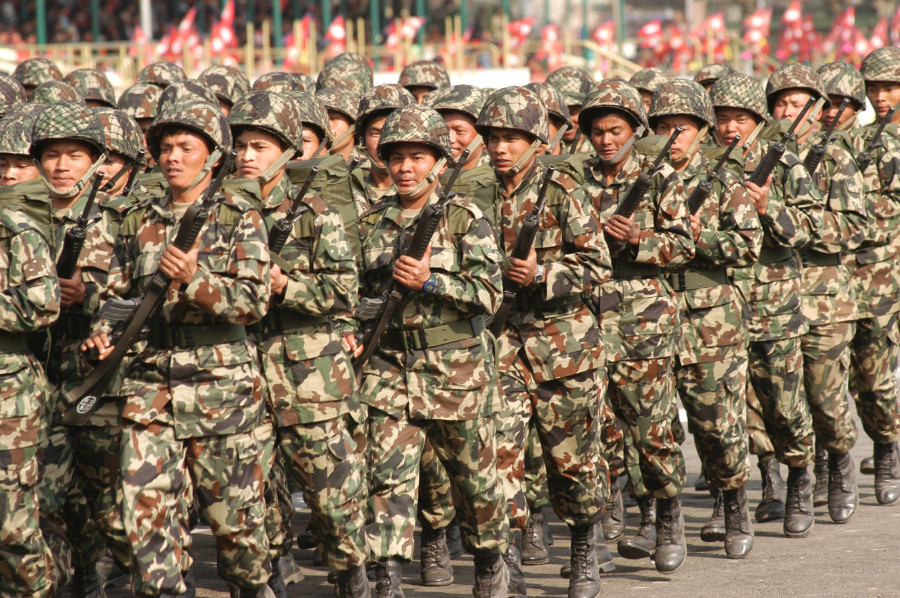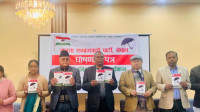National
After attempts to set up an all-powerful intelligence department, the government mulls a similar structure under Army
The Army’s intelligence service will overshadow the one under the prime minister, security experts say.
Binod Ghimire
About two months after tabling the Nepal Special Service Bill, which allows the National Intelligence Department to surveil citizens, the KP Sharma Oli administration has now drafted a bill that will allow the Nepal Army to form a similar intelligence department.
The bill to amend the Nepal Army Act 2006 envisions an “intelligence service” within the national defence force. The current Act allows the Army to only conduct intelligence work, with no provisions for intelligence service, for which a separate regulation will be required. Currently, the Army has a Directorate of Military Intelligence, led by a major general, which reports to the Chief of Army Staff. The intelligence service will mean a separate entity within the Army, apart from the Directorate of Military Intelligence, and staff for this will be hired from the infantry. Its mandate, however, will be defined by a new regulation.
“The amendment is necessary to make intelligence activities more effective so that the Nepal Army can perform its duties as envisioned in the Constitution of Nepal,” said Ishwar Pokhrel, the minister for defence, in a note registered at the federal parliament with the bill on Sunday. “Modernising intelligence service that is compatible with the present time is necessary so as to make the Army perform its job effectively and face challenges that might emerge in the future.”
Shanta Bahadur Sunar, spokesperson for the defence ministry, said that the amendment bill was drafted in “good faith”.
“I believe the Army intelligence will be more transparent once the law is in place,” Sunar told the Post.
Security analysts, however, say there should be a clear answer as to why the national defence force requires a robust intelligence service when the government is already preparing to strengthen the existing intelligence department. Army intelligence deals with external circumstances that could pose a threat to national security, they say.
According to Indra Adhikari, author of a book on the relationship between the military and democracy, such intelligence is only required if the country is in crisis or there is an imminent threat. At other times, intelligence gathering is the function of the civilian police, not the national defence force.
“Internal security is under the purview of the civil police and the Army’s role only comes when the country is under threat from foreign actors,” Adhikari told the Post. “I don’t see such a threat, so the Army doesn’t need such a powerful intelligence service right now.”
The armies of numerous countries have intelligence departments but these countries tend to be actively engaged in conflict or are under threat from foreign actors. India has a separate army intelligence service, but all information gathered by the army is shared with the National Security Council, the security advisor and the prime minister.
In Nepal, the prime minister doesn’t have a security advisor and the Security Council is largely defunct.
“I think the Army’s intelligence will overshadow the one that is under the prime minister,” said Adhikari.
The picture will become clearer once regulations are introduced to guide the Army’s intelligence service, as it will also define jurisdictions, she said.
There are also concerns about the potential for overreach by the Nepal Army, as its dealings are largely opaque. And with the Special Sercive Bill, registered by the Prime Minister's Office on November 11 last year, which allows the intelligence department to monitor or intercept audio or audiovisual conversations at the individual or institutional level, there are fears that civil liberties, especially the right to privacy, could be curtailed.
While Sunar, the defence ministry spokesperson, said there was no need for concern, Dipak Prakash Bhatta, a lawmaker, said that everything regarding the Army’s intelligence should be transparent.
“I believe this bill has provided an opportunity to discuss the need for a separate intelligence service within the Army,” said Bhatta. “The Parliament will only endorse it after thorough deliberations on its consequences.”




 16.12°C Kathmandu
16.12°C Kathmandu















